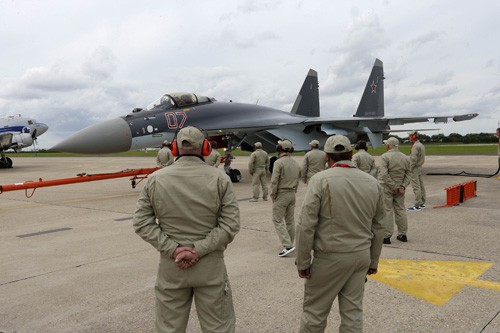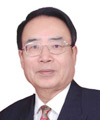|
 |
|
JET SETTERS: Engineers check a Russian Sukhoi SU-35 fighter jet at Le Bourget Airport, near Paris on June 20, during the 50th International Paris Air Show (XINHUA/REUTERS) |

Russian President Vladimir Putin topped Forbes ranking of the world's most powerful figures released on October 30, while U.S. President Barack Obama fell to second place. This was the first time since the end of the Cold War that the U.S. president lost the No. 1 spot on the annual list.
The gross domestic product of the United States stands at nine times that of Russia's. U.S. military expenses in 2012 were the largest in the world at $682 billion (7.5 times that of Russia's, which were $91 billion). Moreover, the United States engaged in partial wars repeatedly after the Cold War. Why has Putin's influence surpassed his U.S. counterpart now?
Diplomatic policies
The United States has accused other countries of hacking into its information security, often coming across as an international policeman. In June, former U.S. NSA employee Edward Snowden exposed the U.S. "PRISM" plan, through which the organization has monitored U.S. citizens and foreign leaders through the Internet. The ensuing scandal embarrassed the United States and damaged the country's credibility. While the United States declared Snowden a traitor, the international media crowned him as a hero in the name of cyber security and personal freedom.
In spite of U.S. pressure to extradite Snowden, Putin stated that Russia would not transfer the whistleblower to the United States. After coordination between Russian judicial and diplomatic departments, the Russian judicial department finally accepted Snowden's temporary asylum request. Putin's tough but flexible style won global praise, as his decision protected Russia's status while maintaining Russian-
U.S. relations. Now Russia is actively involved in the Snowden issue, allowing the former U.S. NSA employee to work and live in its territory. Meanwhile, Obama and his governmental departments have remained comparatively passive on the issue.
Russia has been dealing skillfully with the Syrian chemical weapon crisis as well. After a UN investigation group returned fruitlessly after being attacked, the United States expressed interest in using military intervention to solve the crisis and end Bashar al-Assad's administration without the completion of a UN investigation report. Russia vetoed the U.S. solution in the UN Security Council. The council finally passed a resolution to destroy chemical weapons in Syria, which are possibly being stored and used both by the Syrian Government and the opposition. China and Russia's stances are similar on the Syria issue: the crisis must be solved through political means, and all chemical weapons must be destroyed under the framework of the Chemical Weapon Convention. Their solution was applauded by the UN Security Council.
Russia's diplomacy has clearly demonstrated more intelligence on this issue. Russian Foreign Minister Sergey Lavrov visited Damascus with Putin's blessing and Russia's bottom line, convincing President al-Assad to abandon the hard-line attitude against U.S. pressure. Syria announced on September 9—a crucial date that may have decided peace or war—that it was willing to hand over all chemical weapons and destroy them under international supervision. Russia immediately expressed support, calling on the Syrian Government to begin negotiations with Washington to reach consensus. Russia has its own considerations toward the Syrian issue, for example, it has a military base in the Syrian port of Tartous. However, it also shoulders international obligations as an influential power. After all, it was Russia's diplomatic efforts that helped prevent the cataclysm of war, bringing credit both for Putin and the country.
Putin's strategy
Putin took a tough diplomatic stance when starting his third term in 2012, but Russia's hard-hitting diplomatic strategy can be traced back two decades further.
After the Soviet Union's disintegration, Russia experienced nearly 10 years of recession, during which the country was criticized for its fall to the West. Russia didn't get the promised assistance from the West, and its sphere of influence shrank day after day.
Putin was the chosen successor of President Boris Yeltsin. Putin became the Russian premier in 1999. In the second Chechen war in 1999, he piloted a fighter aircraft to the frontline, commanding the war that struck Chechen separatists. After the conflict, he oversaw allowing Chechens administrate their own country, while allocating huge amounts of money to help the country's economic recovery. These policies won Putin the praise and support of the people.
Putin took office as Russian president after an early election in March 2000 after Yeltsin's resignation in late 1999. His era began, as did Russia's economic development and recovery. Putin demonstrated an understanding of the post-Cold War international order when he warned that Russia must be alert to the danger of becoming a second-rate, or even a third-rate country. He devised a strategy of reinvigorating Russia by implementing strong domestic and military policies.
| 